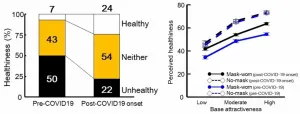INFORMATION:
Professional rugby may be associated with changes in brain structure
Participation in elite adult rugby may be associated with changes in brain structure.
2021-07-22
(Press-News.org) Participation in elite adult rugby may be associated with changes in brain structure.
This is the finding of a study of 44 elite rugby players, almost half of whom had recently sustained a mild head injury while playing.
The study, part of the Drake Rugby Biomarker Study, was led by Imperial College London and published in the journal Brain Communications.
The research found a significant proportion of the rugby players had signs of abnormalities to the white matter, in addition to abnormal changes in white matter volume over time.
White matter is the 'wiring' of the brain, and helps brain cells communicate with each other. The research team say more work is now needed to investigate the long-term effects of professional rugby on brain health.
Professor David Sharp, senior author from Imperial's Department of Brain Sciences, said: "Despite relatively high rates of head injury and an increasing focus on prevention, there has been relatively little research investigating the long-term effects of rugby participation. More objective measures of the effects of sporting head injuries on the brain are needed to assist with the assessment and management of individual players.
"Our research using advanced magnetic resonance imaging suggests that professional rugby participation can be associated with structural changes in the brain that may be missed using conventional brain scans. What is not clear at this stage is the long-term clinical impact of these changes. Further research is needed to understand the long-term implications of repeated head injuries experienced during a rugby career and to provide more accurate ways to assess risk for an individual."
The work, in collaboration with University College London, was funded and instigated by The Drake Foundation, who brought together academia and sport for this pioneering study, and was additionally supported by the National Institute for Health Imperial Biomedical Research Centre, the UK Dementia Research Institute and the Rugby Football Union.
Lauren Pulling, The Drake Foundation's CEO, said: "The Drake Foundation would like to thank the RFU, rugby clubs and research team for their support in this vital study. At present, the long-term consequences of these brain structure abnormalities are unknown and require further research. However, taken together with existing evidence across different sports, as well as recent cases of rugby players being diagnosed with brain diseases in their 40s, they are painting a concerning picture when it comes to players' long-term brain health."
The study, which took place between July 2017 and September 2019, assessed 41 male players, and three female.
All underwent a type of brain scan called an MRI, and around half then had a second MRI scan a year later. The study used two advanced types of MRI called susceptibility weighted imaging and diffusion tensor imaging. This allowed them to look at the structure of blood vessels and the white matter. The study is the first to assess long-term changes in MRI images of professional rugby players.
The rugby players were compared to athletes in non-collision sports, as well as individuals who were not athletes.
Among the group of rugby players, 21 were assessed shortly after sustaining a mild head injury, called a mild traumatic brain injury. In professional rugby union in England, these types of head injuries, which often cause concussions, are the most common reported match injury - accounting for one in five injuries.
The scientists analysed the brain scans for changes in the white matter of the brain, and compared these to the athletes in non-collision sports, and the non-athletes.
The results revealed that 23 percent of all of the rugby players showed abnormalities to their cell axons (the 'wires' of brain cells), or small tears in blood vessels. These tears cause small leaks in the brain, called microbleeds.
These changes were seen in both players with and without a recent head injury.
In addition, the scans provide evidence for unexpected changes in white matter volume across the whole group of rugby players. These could indicate a longer-term effect of these abnormalities to connections in the brain. However, further research is needed to understand the significance of these changes in brain structure.
The research team also asked the players to complete assessments, such as memory tests, to analyse their brain function. The results revealed players with abnormalities in their brain structures did not perform worse than players without abnormalities.
The study team add that long-term studies are needed to investigate the long-term effects on brain health. They add that other health benefits of sports participation must also be taken into account when assessing impact on the brain health.
Mr Karl Zimmerman, lead author of the research, from Imperial's Department of Brain Sciences, said: "The implications on an individual level of the brain changes associated with elite rugby participation are unclear, although obviously it is concerning to see these changes in some of the players' brains. It is important to note that our results in adult professional rugby union and league players are not directly comparable to those who play at local or youth levels. The overall health benefit of participating in sports and physical exercise have been well established including the reduction in mortality and chronic diseases such as dementia. Long-term studies are now needed of both active and retired rugby players to investigate the effect of participation on long-term brain health."
Dr Simon Kemp, Medical Services Director at the Rugby Football Union (RFU) added: "The RFU is fully committed to advancing our understanding of the short, medium and long term consequences of head impacts and concussions so that we can ensure we can make continued improvements in player welfare. We welcome any research that helps to advance our knowledge which is why we actively collaborated with the academic institutions on the Drake Foundation Rugby Biomarker Study from its inception, particularly to promote the recruitment of players. While it is unclear from that research what the individual long-term implications are regarding the brain changes seen in these advanced imaging techniques, it is clearly a priority to investigate this further. To further develop our understanding the RFU, in partnership with Premiership Rugby and independent experts, will be providing a specialist clinical service for the assessment and management of retired elite male and female rugby players between the ages of 30-55 to individually assess their brain health. An integrated research programme will review the risk, causes, assessment and management of brain problems for those who have participated in elite rugby."
The study was carried out in collaboration with UCL researchers Dr Etienne Laverse and Professor Huw Morris from the Department of Clinical and Movement Neuroscience, UCL Queen Square Institute of Neurology.
Professor Huw Morris said: "We have more to learn about the mechanisms and consequences of head injury, and the best approaches to player assessment. This Imperial/UCL collaborative study has brought together expertise from brain sciences across London. The Drake Foundation have pioneered work in this field in the UK and we are very grateful for the support of the foundation, players, medical teams, clubs and the RFU in carrying out this work. We hope that this work, and understanding the long-term implications will ultimately improve safety across contact sports."
ELSE PRESS RELEASES FROM THIS DATE:
COVID-19: Patients with malnutrition may be more likely to have severe outcomes
2021-07-22
Adults and children with COVID-19 who have a history of malnutrition may have an increased likelihood of death and the need for mechanical ventilation, according to a study published in Scientific Reports.
Malnutrition hampers the proper functioning of the immune system and is known to increase the risk of severe infections for other viruses, but the potential long-term effects of malnutrition on COVID-19 outcomes are less clear.
Louis Ehwerhemuepha and colleagues investigated associations between malnutrition diagnoses and subsequent COVID-19 severity, using medical records for 8,604 children and 94,495 adults (older than 18 years) who were hospitalised with COVID-19 in the United States between March and June 2020. Patients with a diagnosis ...
Study shows cancer misinformation common on social media sites
2021-07-22
A new study published online today in the Journal of the National Cancer Institute reports that one third of the most popular cancer treatment articles on social media contain misinformation. Further, the vast majority of that misinformation has the potential to harm cancer patients by supporting approaches that could negatively impact the quality of their treatment and chances for survival. The study also showed that articles containing misinformation garner more attention and engagement than articles with evidence-based information.
The internet is a major source for health information, and misinformation is growing among many types of health conditions. This is an urgent challenge because it can result in patients making ...
Higher levels of omega-3 acids in the blood increases life expectancy by almost five years
2021-07-22
Levels of omega-3 fatty acids in the blood are as good a predictor of mortality from any cause as smoking, according to a study involving the Hospital del Mar Medical Research Institute (IMIM), in collaboration with The Fatty Acid Research Institute in the United States and several universities in the United States and Canada. The study, published in The American Journal of Clinical Nutrition, used data from a long-term study group, the Framingham Offspring Cohort, which has been monitoring residents of this Massachusetts town, in the United States, since 1971.
Researchers have found that omega-3 levels in blood erythrocytes (the so-called red blood cells) are very good mortality risk predictors. The study concludes that "Having higher levels of these ...
Antibiotics may help to treat melanoma
2021-07-22
Some antibiotics appear to be effective against a form of skin cancer known as melanoma. Researchers at KU Leuven, Belgium, examined the effect of these antibiotics on patient-derived tumours in mice. Their findings were published in the Journal of Experimental Medicine.
Researchers from KU Leuven may have found a new weapon in the fight against melanoma: antibiotics that target the 'power plants' of cancer cells. These antibiotics exploit a vulnerability that arises in tumour cells when they try to survive cancer therapy.
"As the cancer evolves, some melanoma cells may escape the treatment and stop proliferating to 'hide' from ...
Mobility restrictions can have unexpected impacts on air quality
2021-07-22
An international collaborative study led by University of Helsinki has conducted a holistic study to investigate the effects of COVID-19 restrictions on several air quality pollutants for the Po Valley region in northern Italy. The area is well known to have one of the worst air quality standards in Europe and is highly influenced by anthropogenic (human-led) activities. The study was done between research groups in Finland, Italy and Switzerland and the results were published in the journal Environmental Science: Atmospheres.
Scientists have combined air quality measurements and computer simulation data over several locations in the region. The resulting studies show that reduced emissions from traffic lead to a strong reduction of nitrogen ...
Targeted removals and enhanced monitoring can help manage lionfish in the Mediterranean
2021-07-22
Targeted removals can be effective in suppressing the number of invasive lionfish found within protected coastlines around the Mediterranean Sea.
However, if they are to really be successful they need to be combined with better long-term monitoring by communities and conservationists to ensure their timing and location achieve the best results.
Those are the key findings of a new study, one of the first of its kind to examine the effectiveness of targeted lionfish removals from both an ecological and a socio-economic perspective.
Scientists working as part of the European Union-funded RELIONMED project ...
Pandemic changed perceptions of masked faces
2021-07-22
The Covid-19 pandemic has improved perceptions of facial attractiveness and healthiness of people wearing face masks in Japan.
Wearing sanitary facemasks was not uncommon in Japan prior to the Covid-19 pandemic. Public health initiatives during the pandemic have led to a drastic increase in the use of facemasks as they reduce the transmission of the SARS-CoV-2 virus. The sanitary-mask effect is a model that predicted how facemasks affected perceptions of facial attractiveness. However, as mindsets might have changed due to the pandemic, it is likely that the sanitary-mask effect has been altered.
A team of four scientists, including Professor Jun I. Kawahara from Hokkaido University's ...
Smokeless tobacco used more by pregnant women in South East Asia than non-pregnant women
2021-07-22
Pregnant women in South East Asia are more likely to use smokeless tobacco than non-pregnant women, despite the added risk of foetal harm during pregnancy.
The study - from the University of York - also suggests that there is no difference in smoking between pregnant women and non-pregnant women in many lower to middle income countries.(LMICs)
Researchers analysed data from 42 lower to middle income countries (LMICs) and also conducted a separate sub-group analysis for the South East Asia Region. (SEAR)
Researchers said the study is the first to report comparative estimates of tobacco use among pregnant and non-pregnant women from the 42 LMICs encompassing 80,454 pregnant and 1,230,262 non-pregnant women.
Dr Radha ...
Survey finds bullying and harassment systemic in astronomy and geophysics
2021-07-22
Results from a new survey of astronomers and geophysicists show that these sciences have a systemic bullying problem; one that is disproportionately worse for women and those from minority groups. In a survey carried out by the Royal Astronomical Society (RAS) last year of over 650 people in the field, 44% of respondents had suffered bullying and harassment in the workplace within the preceding 12 months. Aine O'Brien, RAS Diversity Officer, will present the key results in a talk at the virtual National Astronomy Meeting on Thursday 22 July.
Key initial findings show:
Disabled, and Black and minority ethnic astronomers and geophysicists are 40% more likely to be bullied than their non-disabled and White colleagues respectively.
Women and non-binary people in the field are 50% more ...
Remote 24-hour monitoring shows sizable, positive effect on cancer patients
2021-07-22
Remote 24-hour monitoring for cancer patients receiving chemotherapy helps to better manage side effects and improve quality of life, finds a study published by The BMJ today.
The researchers say remote monitoring can provide a safe, secure, and "real time" system that optimises symptom management and supports patients to remain at home - and is particularly relevant in the context of the covid-19 pandemic.
Effective symptom monitoring and management is essential during chemotherapy for cancer, but current approaches rely on patients recognising that symptoms are severe ...
LAST 30 PRESS RELEASES:
New knowledge on heritability paves the way for better treatment of people with chronic inflammatory bowel disease
Under the Lens: Microbiologists Nicola Holden and Gil Domingue weigh in on the raw milk debate
Science reveals why you can’t resist a snack – even when you’re full
Kidney cancer study finds belzutifan plus pembrolizumab post-surgery helps patients at high risk for relapse stay cancer-free longer
Alkali cation effects in electrochemical carbon dioxide reduction
Test platforms for charging wireless cars now fit on a bench
$3 million NIH grant funds national study of Medicare Advantage’s benefit expansion into social supports
Amplified Sciences achieves CAP accreditation for cutting-edge diagnostic lab
Fred Hutch announces 12 recipients of the annual Harold M. Weintraub Graduate Student Award
Native forest litter helps rebuild soil life in post-mining landscapes
Mountain soils in arid regions may emit more greenhouse gas as climate shifts, new study finds
Pairing biochar with other soil amendments could unlock stronger gains in soil health
Why do we get a skip in our step when we’re happy? Thank dopamine
UC Irvine scientists uncover cellular mechanism behind muscle repair
Platform to map living brain noninvasively takes next big step
Stress-testing the Cascadia Subduction Zone reveals variability that could impact how earthquakes spread
We may be underestimating the true carbon cost of northern wildfires
Blood test predicts which bladder cancer patients may safely skip surgery
Kennesaw State's Vijay Anand honored as National Academy of Inventors Senior Member
Recovery from whaling reveals the role of age in Humpback reproduction
Can the canny tick help prevent disease like MS and cancer?
Newcomer children show lower rates of emergency department use for non‑urgent conditions, study finds
Cognitive and neuropsychiatric function in former American football players
From trash to climate tech: rubber gloves find new life as carbon capturers materials
A step towards needed treatments for hantaviruses in new molecular map
Boys are more motivated, while girls are more compassionate?
Study identifies opposing roles for IL6 and IL6R in long-term mortality
AI accurately spots medical disorder from privacy-conscious hand images
Transient Pauli blocking for broadband ultrafast optical switching
Political polarization can spur CO2 emissions, stymie climate action
[Press-News.org] Professional rugby may be associated with changes in brain structureParticipation in elite adult rugby may be associated with changes in brain structure.


